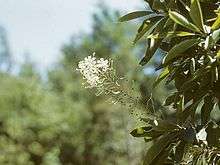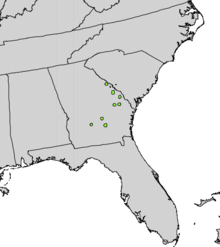Elliottia racemosa
Elliottia racemosa, the Georgia plume or summer plume, is a plant in the family Ericaceae, and is endemic to the U.S. state of Georgia.
| Elliottia racemosa | |
|---|---|
 | |
| Scientific classification | |
| Kingdom: | Plantae |
| Clade: | Tracheophytes |
| Clade: | Angiosperms |
| Clade: | Eudicots |
| Clade: | Asterids |
| Order: | Ericales |
| Family: | Ericaceae |
| Genus: | Elliottia |
| Species: | E. racemosa |
| Binomial name | |
| Elliottia racemosa Muhl. ex Elliot | |
 | |
The plant is found in habitats of moist stream banks to dry ridges, and are usually in sandy soil. It is found at scattered locations in eastern and southern Georgia.[2]
Description
Elliottia racemosa is a rarely occurring species of shrub or sometimes small tree. The leaves are three to four inches long and one to two inches wide. It blooms with white flowers, with four petals. It produces a dry fruit.[3]
The shrub was discovered and illustrated by William Bartram in 1775 and later rediscovered and described in 1808 by the South Carolina botanist Stephen Elliott.[4] The species is listed as threatened.
gollark: Yes, it does not worĸ on phones.
gollark: No, I mean from cold start after I boot up.
gollark: But they're *there* and I can open them.
gollark: Well, it doesn't actually load all the content of every tab, obviously.
gollark: Maybe your laptop is bad.
References
- "NatureServe Explorer 2.0 - Elliottia racemosa, Georgia Plume". explorer.natureserve.org. Retrieved 4 May 2020.
- "Georgia Plume Geographic Distribution". Tree Trail. Retrieved 2010-07-02.
- Authors, Multiple (1986). A Guide To Filed Identification: Trees Of North America. United States: Western Publishing. pp. 242. ISBN 0-307-13658-2.
- "Georgia Plume (Elliottia racemosa)". 2bnTheWild. Retrieved 2009-12-03.
This article is issued from Wikipedia. The text is licensed under Creative Commons - Attribution - Sharealike. Additional terms may apply for the media files.
